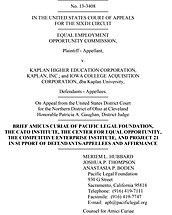Learn more about Cato’s Amicus Briefs Program.
Following several incidents of employee theft, Kaplan University did what any reasonable employer might do in similar circumstances: it instituted heightened screening procedures for new hires. This new process included credit checks to filter out potential employees at greater risk of committing theft. These checks made no mention of any applicant’s race and Kaplan didn’t collect any race information from applicants, thus making the hiring process both race-neutral and race-ignorant. Nevertheless, the Equal Employment Opportunity Commission, which itself uses credit checks in hiring decisions, sued Kaplan under Title VII of the Civil Rights Act, claiming that the use of credit checks has an unlawfully disparate impact on African American applicants. Because Kaplan does not have race data for applicants, the EEOC had to come up with its own data to prove its case. The agency thus created a team of “race raters,” a group of seemingly random people who sorted Kaplan’s job applicants into racial categories based only on the applicant’s name and DMV photo. (You can’t make this stuff up!) Because of the unscientific and unreliable nature of this data, the EEOC was soundly rebuffed in the federal district court in Ohio where it brought its case. Now before the U.S. Court of Appeals for the Sixth Circuit, the EEOC is continuing its awkward crusade against employers’ use of credit checks. Cato, joining the Pacific Legal Foundation, the Center for Equal Opportunity, the Competitive Enterprise Institute, and Project 21, has filed a brief supporting Kaplan and arguing that the EEOC’s use of “race raters” and its incautious application of disparate-impact theory violate the Fifth Amendment’s equal protection guarantee. Classifying people into racial categories based on their name and physical features is a demeaning violation of the Constitution’s mandate that individuals be treated as individuals and not reduced to mere members of a racial class. We also argue that the EEOC’s irresponsible use of disparate-impact theory to attack reasonable business practices contradicts the spirit of equal protection by forcing employers to consider race for all of their business-related decisions in order to avoid bureaucuratic entanglement.

This work is licensed under a Creative Commons Attribution-NonCommercial-ShareAlike 4.0 International License.
